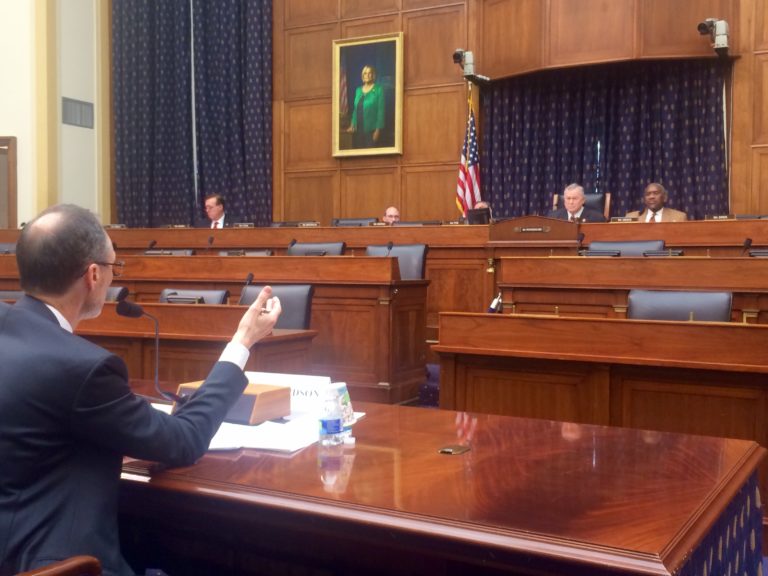 On December 7, 2016, KI Executive Director Charles Davidson testified before the House Foreign Affairs Subcommittee on Europe, Eurasia and Emerging Threats. Watch the opening statements and first questions here.
On December 7, 2016, KI Executive Director Charles Davidson testified before the House Foreign Affairs Subcommittee on Europe, Eurasia and Emerging Threats. Watch the opening statements and first questions here.
STATEMENT OF CHARLES DAVIDSON
Executive Director, Kleptocracy Initiative, Hudson Institute
Corruption: A Danger to Democracy in Europe and Eurasia
Subcommittee on Europe, Eurasia, and Emerging Threats U.S. House of Representatives
December 7, 2016
Chairman Rohrabacher, Ranking Member Meeks, and distinguished members of the Subcommittee, I appreciate the invitation to appear before you today.
Corruption: A Danger to Democracy in Europe and Eurasia
Institutionalized corruption in Europe and Eurasia remains an ongoing challenge to U.S. efforts to promote stable, prosperous, and democratic countries. Corruption undermines rule of law, prevents or subverts institutions from functioning honestly, and encourages cultures of lawlessness. It is generally accepted that the distress that led to the Maidan revolution in Ukraine was primarily a revolt against corruption, and we struggle in our efforts to promote a democratic and free ally there.
When “institutionalized corruption” becomes the norm, and consolidates its political power, when there is “state capture,” we find ourselves facing “kleptocracies,” nations “ruled by thieves.” These kleptocratic regimes have no appetite for democracy. And they can’t withstand free market competition, so corruption of their partners is an existential issue for them.
Across Eurasia, Western diplomats are increasingly ignored when they warn of corruption. Indeed, Western anti-corruption talk is increasingly taken as hypocrisy despite decades of diplomatic effort to support more democratic and transparent societies in Eurasia. How have we reached this state of affairs?
The West has been a Partner in the Plunder of Eurasian States
When a corrupt official or kleptocrat seeks to secure his or her illicitly gained assets, they seek a safe haven, with rule of law protecting property rights. The West, generally speaking, has provided this haven. We have published a paper that describes this process in detail, Stage Hands: How Western Enablers Facilitate Kleptocracy.
Providing a safe haven for the proceeds of corruption establishes an incentive for corrupt practices. In my view this question of incentivization has been neglected, and is key to understanding the overall political challenge faced in terms of reform.
Let us take a Ukrainian example. Under the Yanukovych regime it has been alleged that billions of dollars were stolen at the expense of the state. This theft impoverished already rudimentary public services, delegitimized the regime, and ultimately contributed to its downfall (the Maidan in the first instance a revolt against corruption). A significant portion of this money left the country and entered Western jurisdictions.
Kleptocracy Wrecks Eurasian Democratization
The role of the Western financial system is a major reason why democracies failed to take root in all but a few states in Eurasia following the collapse of the USSR. A golden age of money laundering incentivized state plunder for post-Soviet Eurasian elites. By way of illustration, Russia allegedly lost at least $211.5 billion in illicit financial outflows from 1994 to 2011, whilst since 2004 Ukraine has lost over $116 billion.
Plundered wealth could be laundered and safeguarded, and converted into well-funded new sources of power. This helped steer what was hoped to be a transition to democracy towards a new kleptocratic authoritarian political model.
In our most recent paper we call this The Kleptocracy Curse, which describes among other things the role of Western enablers regarding institutionalized corruption in Eurasia. This is starkly visible in Ukraine, which failed to build either a market economy or a functioning state, fuelling revolutionary discontent. As Western diplomats struggled to impress on Kyiv’s politicians the value of the rule of law, Ukrainian elites were stashing wealth in the West. This happens across Eurasia, where authoritarian elites now treat London, New York, and other Western jurisdictions as corruption services centers.
What are the Costs?
Ignoring the kleptocracy curse risks further political damage. Democratic development and free markets are undermined. Regimes hostile to our values expand their power and influence.
The current state of Europe offers a warning. The Parliamentary Assembly of the Council of Europe, the continent’s oldest human rights institution, has been corrupted and silenced by an authoritarian kleptocratic regime. In France, the leading populist opposition is financed in part by a non-democratic autocracy. Members of the British establishment have business ties to elites from arguably non-democratic, autocratic kleptocracies, even forming an emerging lobby.
The idea of the West as a community of values is critically threatened.
What is to be done?
In terms of what we can do, there is one step that in my view is indispensible, and that is doing away with anonymous shell companies, setting an example that can be leveraged to persuade our allies to follow suit. This notion has been underscored by discussions with law enforcement, private investigators, lawyers, international finance experts and others. Anonymous shell companies are the prime vehicle for concealing ownership of assets and safeguarding the proceeds of corruption, and are used regarding both financial assets and real estate.
A second priority should be seeking other ways to curtail our enabling role, blocking and tackling the nooks and crannies of international finance that are conduits for corrupt proceeds.
We also need to empower our law enforcement to tackle egregious cases, and look into amending the Foreign Corrupt Practices Act to include penalizing the bribe takers.
In parallel we should be vigilant regarding the influence of foreign institutionalized corruption on US soil, for example strengthening the Foreign Agents Registration Act and its enforcement, and strengthening interdictions and monitoring of those representing regimes where institutionalized corruption is a way of life.
KLEPTOCRACY INITIATIVE, 07.12.2016




